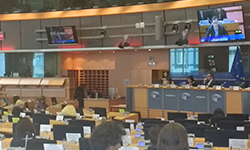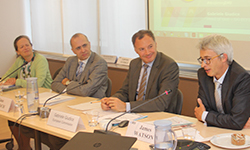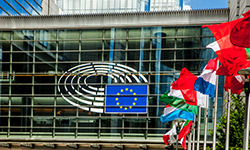BusinessEurope Headlines No. 2017-15
The BusinessEurope Competition Package is now available!
The new BusinessEurope Competition Package for companies was published on 24 April 2017. It is composed of a competition law compliance guide and an out-of-court resolution blueprint for antitrust damages claims. The guide is designed for companies, especially SMEs, and aims to avoid competition breaches in the first place.
It can be described as a “first-aid kit” providing elementary guidance to businesses on competition law compliance. The blueprint aims to provide, whenever possible, a way to address antitrust damages cases without going to court. The availability of a non-judicial route is particularly important for businesses as well as consumers.
![]() Contact: Guido Lobrano
Contact: Guido Lobrano
Looking forward to starting negotiations for an EU-Australia deal
 “With the scoping exercise concluded, we are now only waiting for the mandate to be adopted to see the start of negotiations for a free trade agreement between the EU and Australia”, Markus J. Beyrer, Director General of BusinessEurope, said at a lunch with Mark Higgie, Ambassador of Australia to the EU. Australia is, like its neighbour New Zealand, recognised as a strategic partner in the EU 2015 Strategy “Trade for All”. Even though a faraway country, Australia is a like-minded country that shares the EU approach to an open and fair trade and it is already integrated in the strategic and fast-developing region of South-East Asia, where it has made strong ties with bilateral agreements. BusinessEurope is supportive on the opening of negotiations, and looks forward to having EU sensitivities be taken into account in a balanced deal that includes the protection of International Property Rights and opens up public markets in Australia, which is not yet a member of the GPA-Government Procurement Agreement of the WTO.
“With the scoping exercise concluded, we are now only waiting for the mandate to be adopted to see the start of negotiations for a free trade agreement between the EU and Australia”, Markus J. Beyrer, Director General of BusinessEurope, said at a lunch with Mark Higgie, Ambassador of Australia to the EU. Australia is, like its neighbour New Zealand, recognised as a strategic partner in the EU 2015 Strategy “Trade for All”. Even though a faraway country, Australia is a like-minded country that shares the EU approach to an open and fair trade and it is already integrated in the strategic and fast-developing region of South-East Asia, where it has made strong ties with bilateral agreements. BusinessEurope is supportive on the opening of negotiations, and looks forward to having EU sensitivities be taken into account in a balanced deal that includes the protection of International Property Rights and opens up public markets in Australia, which is not yet a member of the GPA-Government Procurement Agreement of the WTO.
Contact: Eleonora Catella
Increasing protectionism and the transatlantic relation
 The EU and the US seem to be following different paths when it comes to trade and fight protectionism. The EU continues to be a strong advocate of free trade and the need to keep markets open, while the US seems less willing to make public statements in support of free trade and against protectionist measures. How this different approach might have an impact on the transatlantic relation was the subject of a panel discussion organised by the FAES Foundation and the Mertens Centre. BusinessEurope reaffirmed the importance for the EU of keeping an ambitious trade negotiation agenda that delivers new market opportunities for our companies. In an era of striving protectionism, it is even more important that the EU defends free trade; and this should also include transatlantic trade. The US is our major trading partner and we need to ensure that our relation remains strong and dynamic. Any attempts to disturb the “status quo” would be extremely negative for EU and US businesses that are heavily dependent on the transatlantic market.
The EU and the US seem to be following different paths when it comes to trade and fight protectionism. The EU continues to be a strong advocate of free trade and the need to keep markets open, while the US seems less willing to make public statements in support of free trade and against protectionist measures. How this different approach might have an impact on the transatlantic relation was the subject of a panel discussion organised by the FAES Foundation and the Mertens Centre. BusinessEurope reaffirmed the importance for the EU of keeping an ambitious trade negotiation agenda that delivers new market opportunities for our companies. In an era of striving protectionism, it is even more important that the EU defends free trade; and this should also include transatlantic trade. The US is our major trading partner and we need to ensure that our relation remains strong and dynamic. Any attempts to disturb the “status quo” would be extremely negative for EU and US businesses that are heavily dependent on the transatlantic market.
Contact: Luisa Santos
Added benefits of the EU on the environment
 "Overall, an EU approach to environmental protection is key because most companies operate in more than one EU country. 28 national regimes would make their life more complicated." This was a key message from Alexandre Affre at the hearing of the European Parliaments’ ENVI committee on "Added benefits of the EU on the environment, public health and safety" on 25 April. Affre, BusinessEurope’s Director Industrial Affaires commented on the benefits of working together on environment e.g. developing common rules, creating larger market opportunities, being stronger in international negotiations or providing further resources for research and innovation to support environmental technologies. He also stressed that one-size-fits-all is not always the solution and a certain degree of flexibility is important to reflect national and local specificities.
"Overall, an EU approach to environmental protection is key because most companies operate in more than one EU country. 28 national regimes would make their life more complicated." This was a key message from Alexandre Affre at the hearing of the European Parliaments’ ENVI committee on "Added benefits of the EU on the environment, public health and safety" on 25 April. Affre, BusinessEurope’s Director Industrial Affaires commented on the benefits of working together on environment e.g. developing common rules, creating larger market opportunities, being stronger in international negotiations or providing further resources for research and innovation to support environmental technologies. He also stressed that one-size-fits-all is not always the solution and a certain degree of flexibility is important to reflect national and local specificities.
Contact: Alexandre Affre
How trade policy can support SME’s internationalisation
 BusinessEurope participated in a panel discussion in the European Parliament on trade policy and the needs of SMEs. The problems that European companies face when they want to do business in third markets are the same for big and small operators. The main difference is the means that you have to address them. SMEs have resource constraints that can add to the costs of having to cope with different regulations or complex customs procedures when exporting to a third market. These specific needs can be catered by providing SMEs with more information on existing market opportunities, ensuring better monitoring and implementation of existing free trade agreements and pursuing a pro-active market access strategy that addresses companies’ specific problems even in markets where the EU does not have or is not negotiating a free trade agreement. To be effective it is also key to ensure a good cooperation between the different stakeholders from the public and the private sector both at EU and national level.
BusinessEurope participated in a panel discussion in the European Parliament on trade policy and the needs of SMEs. The problems that European companies face when they want to do business in third markets are the same for big and small operators. The main difference is the means that you have to address them. SMEs have resource constraints that can add to the costs of having to cope with different regulations or complex customs procedures when exporting to a third market. These specific needs can be catered by providing SMEs with more information on existing market opportunities, ensuring better monitoring and implementation of existing free trade agreements and pursuing a pro-active market access strategy that addresses companies’ specific problems even in markets where the EU does not have or is not negotiating a free trade agreement. To be effective it is also key to ensure a good cooperation between the different stakeholders from the public and the private sector both at EU and national level.
Contact: Luisa Santos
EU framework programmes play pivotal role for European research and innovation
 The European industry is committed to contributing further to EU research and innovation (R&I), but this requires the right conditions and support. Horizon 2020 – the EU’s framework programme for research and innovation – has brought up a substantially improved system of public funding. “The current mid-term evaluation and next framework programme should build on these achievements and guarantee further simplification”, BusinessEurope stresses in a new position paper. The document offers views on how to maximize the impacts of EU research and innovation in the future. Preserving the three-pillar structure is part of the key messages as well as maintaining the collaborative approach. To foster innovation and bring value from ideas and research to the society, promoting innovation ecosystems of small and large companies, academia and research organisations is key. This will also further contribute to European competitiveness and technological progress in the future.
The European industry is committed to contributing further to EU research and innovation (R&I), but this requires the right conditions and support. Horizon 2020 – the EU’s framework programme for research and innovation – has brought up a substantially improved system of public funding. “The current mid-term evaluation and next framework programme should build on these achievements and guarantee further simplification”, BusinessEurope stresses in a new position paper. The document offers views on how to maximize the impacts of EU research and innovation in the future. Preserving the three-pillar structure is part of the key messages as well as maintaining the collaborative approach. To foster innovation and bring value from ideas and research to the society, promoting innovation ecosystems of small and large companies, academia and research organisations is key. This will also further contribute to European competitiveness and technological progress in the future.
![]() Contact: Jan Bambas
Contact: Jan Bambas
Proposed revision of EU posting of workers directive would harm EU Single Market
 Current EU legislation on posting of workers is appropriate, but the proposed revision of the EU posting of workers directive would greatly harm the single market for all sectors. The focus should be on better enforcement of existing rules and more effective fight against illegal practices. If revised, the rules should continue to fit the needs of various sectors, including those where long term postings are common and important for smooth business operations. The proposed rules on subcontracting would be impracticable and lead many subcontractors to lose markets. Making posting rules more complicated would make enforcement more difficult. These were the main messages given by Maxime Cerutti at an event in the European Parliament on 25 April, co-organised by BusinessEurope and MEP Martina Dlabajova, ALDE shadow rapporteur for the revision of the posting of workers directive. The benefits of international mobility as well as difficulties related with the proposed changes to the directive for businesses and workers were outlined and discussed during the event.
Current EU legislation on posting of workers is appropriate, but the proposed revision of the EU posting of workers directive would greatly harm the single market for all sectors. The focus should be on better enforcement of existing rules and more effective fight against illegal practices. If revised, the rules should continue to fit the needs of various sectors, including those where long term postings are common and important for smooth business operations. The proposed rules on subcontracting would be impracticable and lead many subcontractors to lose markets. Making posting rules more complicated would make enforcement more difficult. These were the main messages given by Maxime Cerutti at an event in the European Parliament on 25 April, co-organised by BusinessEurope and MEP Martina Dlabajova, ALDE shadow rapporteur for the revision of the posting of workers directive. The benefits of international mobility as well as difficulties related with the proposed changes to the directive for businesses and workers were outlined and discussed during the event.
Contact: Magdalena Bober
The need to complete the EMU remains a matter of urgency for business
 “Completion of the Economic and Monetary Union (EMU) as well as greater effort to strengthen trust in the Euro remains both a priority and a matter of urgency for business”, BusinessEurope’s Economics Director James Watson highlighted at an event on "The Future of the EMU – Is the White Paper pointing into the right direction?". The discussion, taking place at BusinessEurope’s premises 25 April, was jointly organised by the Federation of German Industries (BDI) and BusinessEurope. Ahead of the European Commission’s reflection paper on EMU scheduled for 31 May, James went on to stress the importance of strengthening economic, financial and capital markets and fiscal union, with the completion of the banking union an immediate priority. James noted that while proper enforcement of the Stability and Growth Pact (SGP) is essential, it is also important that the SGP gives the fullest support possible to EU Member States who wish to orientate their budgets towards investment and growth-supporting expenditure. Link to recent BusinessEurope letter to Commission President Juncker on EMU.
“Completion of the Economic and Monetary Union (EMU) as well as greater effort to strengthen trust in the Euro remains both a priority and a matter of urgency for business”, BusinessEurope’s Economics Director James Watson highlighted at an event on "The Future of the EMU – Is the White Paper pointing into the right direction?". The discussion, taking place at BusinessEurope’s premises 25 April, was jointly organised by the Federation of German Industries (BDI) and BusinessEurope. Ahead of the European Commission’s reflection paper on EMU scheduled for 31 May, James went on to stress the importance of strengthening economic, financial and capital markets and fiscal union, with the completion of the banking union an immediate priority. James noted that while proper enforcement of the Stability and Growth Pact (SGP) is essential, it is also important that the SGP gives the fullest support possible to EU Member States who wish to orientate their budgets towards investment and growth-supporting expenditure. Link to recent BusinessEurope letter to Commission President Juncker on EMU.
![]() Contact: James Watson
Contact: James Watson
Clarity is needed on application of competition rules in e-commerce
 With the growing importance of online distribution and e-commerce, BusinessEurope appreciates the work done by the European Commission through the e-commerce inquiry to look closely into how these markets are functioning. Speaking at the European Consumer and Competition Day organised by the Maltese EU Presidency on 24 April in St. Julien, Malta, Deputy Director Guido Lobrano of BusinessEurope stressed that competition rules must ensure a level playing field between the various e-commerce players for the ultimate benefit of consumers. Manufacturers should be able to ensure that products are sold in a way that reflects their brand image, while retailers should not face undue restrictions that disproportionately limit their online activity.
With the growing importance of online distribution and e-commerce, BusinessEurope appreciates the work done by the European Commission through the e-commerce inquiry to look closely into how these markets are functioning. Speaking at the European Consumer and Competition Day organised by the Maltese EU Presidency on 24 April in St. Julien, Malta, Deputy Director Guido Lobrano of BusinessEurope stressed that competition rules must ensure a level playing field between the various e-commerce players for the ultimate benefit of consumers. Manufacturers should be able to ensure that products are sold in a way that reflects their brand image, while retailers should not face undue restrictions that disproportionately limit their online activity.
Contact: Guido Lobrano
Waste legislation must be fit-for-purpose
 "The on-going revision of EU waste legislation is key to make it fit-for-purpose. Europe needs a more efficient waste management system helping to recover waste as a valuable resource for the economy", said Alexander Kessler, chairman of BusinessEurope’s Waste Task Force. On 25 April, BusinessEurope discussed the revision of the waste framework and landfill of waste directives with representatives from EU Member States. Kessler stressed the necessary adjustments of some of the definitions, the two-entry points calculation method, the harmonised approach on by-products and end-of-waste as well as the proper implementation of the Extended Producer Responsibility and the authorisation of landfilling for non-recoverable industrial waste having undergone a pre-treatment process.
"The on-going revision of EU waste legislation is key to make it fit-for-purpose. Europe needs a more efficient waste management system helping to recover waste as a valuable resource for the economy", said Alexander Kessler, chairman of BusinessEurope’s Waste Task Force. On 25 April, BusinessEurope discussed the revision of the waste framework and landfill of waste directives with representatives from EU Member States. Kessler stressed the necessary adjustments of some of the definitions, the two-entry points calculation method, the harmonised approach on by-products and end-of-waste as well as the proper implementation of the Extended Producer Responsibility and the authorisation of landfilling for non-recoverable industrial waste having undergone a pre-treatment process.
![]() Contact: Morgane Humbert
Contact: Morgane Humbert
Calendar
- 2-3 May 2017: B20 Summit, Berlin
- 4 May 2017: 20th European corporate governance conference (Malta)
- 4-6 May 2017: State of the Union 2017 conference, Florence (Italy)
- 5 May 2017: meeting of BusinessEurope’s Council of Presidents, Malta
- 6 May 2017: Europe day in Brussels
- 7 May 2017: French presidential elections (2nd round)
- 22-23 May 2017: European Business Summit, Brussels